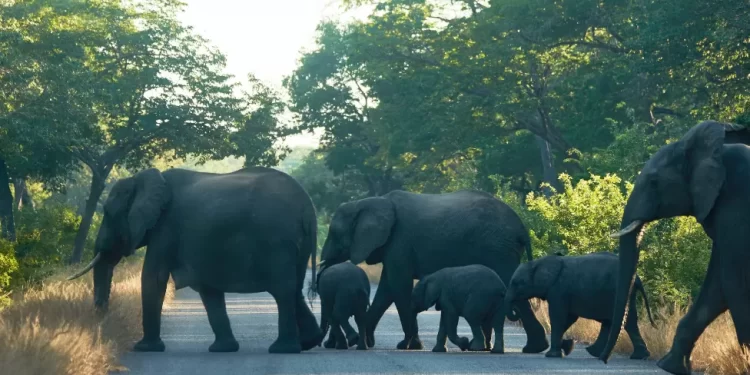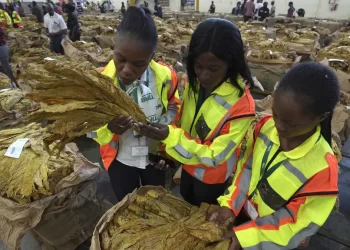Tinashe Farawo had the grim task of delivering the mutilated body of a 30-year-old farmer who had been trampled to death by an elephant in northern Zimbabwe to his distraught family.
It is something that Zimbabwe Parks and Wildlife Management Authority (Zimparks) rangers have to do all too frequently as they police a battle between humans and encroaching wildlife.
The farmer from Mbire district was one of 46 people killed by wild animals in Zimbabwe this year.
Hwange National Park, the country’s large nature reserve spanning 14,600 sq km (5,637 sq miles) in north-western Zimbabwe, has the capacity to sustain 15,000 elephants.
Yet officials say the population there now stands at around 55,000, with many straying into surrounding areas in search of food and water.
And the jumbos are greedy – a single elephant consumes up to 200 litres (44 gallons) of water a day and around 400kg (about 62st) of tree leaves and bark – causing great distress to already impoverished subsistence farmers.
‘We don’t want aid’
In May, Zimbabwe convened an African Elephant Summit but failed to unite countries on the continent to fight the ban on the global ivory trade, issued under Cites in 1989.
Only Zambia, Namibia and Botswana backed Zimbabwe’s push for permission sell off its ivory stockpiles, mostly from elephants that had died from natural causes and which would be worth hundreds of millions of dollars.
The same countries also support trophy hunting as a way to finance community projects for those who live close to game parks.
“We don’t want to need aid, we want the chance to trade so we can fund our programmes,” Mr Farawo said.
But Kenya, which opposes both hunting and the sale of ivory, did not attend the summit. The East African country symbolically burnt its ivory stockpile confiscated from poachers and illegal traders in 2016.
While Burkina Faso, Equatorial Guinea, Mali and Senegal have proposed to Cites that the elephants in southern Africa be upgraded to give them “threatened-with-extinction status”, further restricting any trade.
Jim Nyamu, who heads the Kenya-based Elephant Neighbours Centre, argues that lifting the trade in ivory in southern Africa would impact East Africa, where elephant numbers remain a concern.
He points to Cites’ decision to allow a one-off ivory sale from Botswana, Namibia and Zimbabwe to Japan and China in 1997 and 2008, saying it led to an increase in poaching.
“No country should be encouraged to work in insolation,” the anti-poaching campaigner told the BBC.
Mr Nyamu believes in alternatives like eco-tourism, which have the potential to bring in more money to communities than hunting.
Wild animals in towns
But there is little support for this on the ground in Botswana, which controversially resumed trophy hunting in 2019 as a way to reduce its burgeoning 130,000-strong elephant population.
In Botswana’s Chobe district, which borders Zimbabwe, elephants outnumber the population of 28,000 people. Like nearby Hwange, the area’s national park is unfenced.
Chieftainess Rebecca Banika, a Chobe traditional leader, told the BBC that her community received $560,000 from hunting proceeds last year, along with the meat of dead tuskers.
“We are suffering but even though we are angry, we don’t fight the animals because we derive some benefit from them,” she said.
Frank Limbo, a 64-year-old retired banker and now farmer, says sightings of wild animals were rare during his youth but now they are all over the town of Kasane in Chobe.
They wander into backyards and several of his relatives have been either killed or maimed and entire food harvests destroyed overnight.
He is also the unlikely survivor of two terrifying wildlife attacks.
In 2004 a lioness was chasing down his pet dog on his farm, when it turned on him – luckily for him an armed friend shot her dead.
Eleven years later, while preparing his fields for planting, a herd of elephants wandered past. Moments later three returned and charged him.
“They all came making those the noises they do when they attack – wailing – and I was also yelling and wailing.”
He was saved by running behind a tree: “They couldn’t get to me fully but one gorged me from my knee to my upper thigh. I thought I was dead.”
Some conservationists in southern Africa also question the figures on which decisions about elephants are made.
To this end the Kavango-Zambezi Transfrontier Conservation Area (Kaza TFCA), which spans reserves in Angola, Botswana, Namibia, Zambia and Zimbabwe, organised a joint aerial elephant census in August – the figures of which will be released next year.
It followed a decision last year by the International Union for the Conservation of Nature (IUCN), which keeps a “red list” of threatened species, to list the African savanna elephants as endangered.
It cited population decline – a 95% fall over the last century as a result of poaching, shrinking habitats and a growing human population.
Netsai Bollmann from Kaza TFCA says the data used was based on estimates.
The elephant census initiative shows that countries in southern Africa, where elephant populations are growing, want more sovereignty in determining what happens to their wildlife.
In Zimbabwe, which has just approved plans to set up a fund to help people attacked in wildlife attacks, Edson Gandiwa – a wildlife researcher who works at Zimparks – says the problem with the elephant conservation debate is that it is too emotionally charged.
“They are a keystone or flagship species. [But] it’s not only about elephants, it’s about biodiversity. We need all animals to be there,” he told the BBC.
Mr Limbo agrees, saying the 2.5 million people who live near Kaza TFCA wildlife areas deserve to be consulted by international groups before global policies are implemented.
He maintains the attack he suffered has not affected the way he feels about elephants: “It’s part of living in this area, we love them.
“They are our natural resources, we can’t do away with them – we have to live side-by-side. But it should be a win-win.”











